With the ever-growing demand for sustainable solutions in everyday life and celebrations, a move towards an array of top-rated, biodegradable utensils has become inevitable. It’s my pleasure to present you with 11 exceptional alternatives to traditional plastic cutlery that are not just environmentally friendly, but a big step towards reducing the immense annual disposal of over 40 billion plastic utensils in the U.S. alone.
These compostable utensils, made from materials like Non-GMO corn, harvested bamboo, and sustainable wood, promise not just a practical solution for your party needs, but offer a chance to support reforestation efforts, indulge in toxin-free dining experiences and ultimately protect our oceans from the perilous impact of plastic cutlery. So, join me in discovering these top-rated choices that promise durability, aesthetic appeal, and most importantly, a commitment to the planet’s future.
Key Takeaways:
- The move towards biodegradable utensils helps reduce the annual disposal of over 40 billion plastic utensils in the U.S.
- Compostable cutlery is made from sustainable materials like Non-GMO corn, harvested bamboo, and sustainable wood, offering a minimal carbon footprint.
- Biodegradable utensils help in supporting reforestation efforts and protect our oceans.
- Choosing eco-friendly, compostable cutlery offers toxin-free dining experiences.
- Top-rated biodegradable utensils offer durability, aesthetic appeal, and a commitment to the planet’s future.
11 Biodegradable Utensil Brands
Here is a list of 11 biodegradable utensil brands and some tips and statistics on each:
- Ecovita
- 100% compostable tableware made from bagasse, bamboo, paper, cornstarch, and fallen leaves
- Decomposes within 30-60 days after being discarded
- BioMass Packaging
- Utensils made from wood pulp and vegetable starch
- Can biodegrade in home compost piles within 180 days
- Aspenware
- Wooden utensils made from aspen trees
- Uses excess wood from the lumber industry
- Clickeat
- Disposable wooden utensils that snap apart
- Compostable and biodegradable
- GreenGood
- Plant-based cutlery made from corn, sugarcane, wheat stalks
- Commercially compostable
- Stroodles
- Edible cutlery made from wheat flour, millet flour, rice flour
- 100% biodegradable
- Eco Kloud
- Bamboo utensils
- Reusable and compostable
- Eco-Products
- Plant-based cutlery and dinnerware
- BPI-certified commercially compostable
- World Centric
- Compostable plant fiber cutlery and dinnerware
- Carbonfree® certified
- Vegware
- Award-winning range of compostable catering supplies
- Made from plants and materials like cornstarch
- Carries a variety of eco-friendly cutlery
- Prices as low as $7 per case of 400 utensils
The Rise of Biodegradable Utensils in Modern Celebrations
As concerns regarding environmental preservation escalate, there’s been a noticeable deviation from dangerous habits, such as the use of disposable plastic cutlery. Reflecting this shift, eco-friendly utensils are gaining popularity rapidly.
The Environmental Impact of Disposable Plastic Cutlery
Disposable plastic cutlery, a staple in fast-food restaurants and takeaway joints, has detrimental environmental consequences. Although they’re useful for barely 15 minutes, their environmental impact extends over centuries—about 400 years required for complete decomposition. This results in a significant increase in landfill mass and emission of harmful greenhouse gases.
Moreover, the plastic cutlery disintegrates into microplastics which permeate our ecosystem. The average American has been found to ingest approximately 74,000 microplastic particles every year due to such pervasive contamination—unarguably a sobering reality calling for major changes in our lifestyle.
Why Eco-Friendly Utensils Are Gaining Popularity
As awareness about these harrowing consequences increases, the popularity of eco-friendly utensils soars. These utensils made of plant-based materials, such as corn starch and bamboo, offer convenience without the accompanying guilt of environmental harm. These planet-friendly alternatives are becoming a norm in all kinds of events, from casual picnics to grand weddings.
These sustainable choices echo the sentiments of conscious consumers who prioritize planetary health alongside the festive spirit of their gatherings. The days of single-use plastic are numbered with increasing awareness and the readily available alternatives that reduce plastic waste.
| Material | Lifespan | Decomposition Time |
|---|---|---|
| Disposable Plastic Cutlery | 10-15 minutes | 400 years |
| Eco-friendly Utensils (Bamboo, Corn Starch) | Single Use | A few months to a year in commercial composting |
With the promise of a smaller carbon footprint and a safer environment, the switch to eco-friendly utensils from disposable plastic cutlery seems to be an obvious choice in the march toward sustainable living.
Understanding Compostable vs. Biodegradable Utensils
The recent wave of eco-conscious consumerism has overhauled the disposable cutlery market with two key alternatives receiving much attention: compostable utensils and biodegradable utensils. Against this backdrop, understanding the distinctions between them is crucial for anyone looking to reduce the ecological footprint of their disposable cutlery.
Biodegradable utensils, as their name suggests, are capable of decomposing naturally over time without the need for external processing. However, this term does not specify the timeline required for complete breakdown, which can range anywhere from a few years to several decades.
In contrast, certified compostable utensils are governed by stricter criteria. These utensils need to disintegrate into nutrient-rich, non-toxic biomass within a specific timeframe, typically under the conditions maintained by industrial composting establishments. These standards noticeably deviate from those of backyard composting setups.
Certification by reliable third-party organizations – such as BPI or CMA – guarantees that these utensils will not linger in landfills for centuries, unlike their conventional plastic counterparts. Instead, when disposed of appropriately at a commercial facility or, in some select cases, at home compost systems, they recirculate back into the earth in the form of fertile soil.
Understanding the crucial differences between compostable and biodegradable utensils is key to ensuring we make conscious, sustainable choices that contribute to preserving the planet’s health.
Material Matters: What Are Eco-Friendly Utensils Made Of?
The fight against plastic pollution is being substantially strengthened by the use of innovative, sustainable materials that serve as the backbone of eco-friendly utensils. A complete transition away from damaging, non-degradable plastics to renewable resources is not just an environmental statement, it’s a lifestyle commitment to partnering with nature.
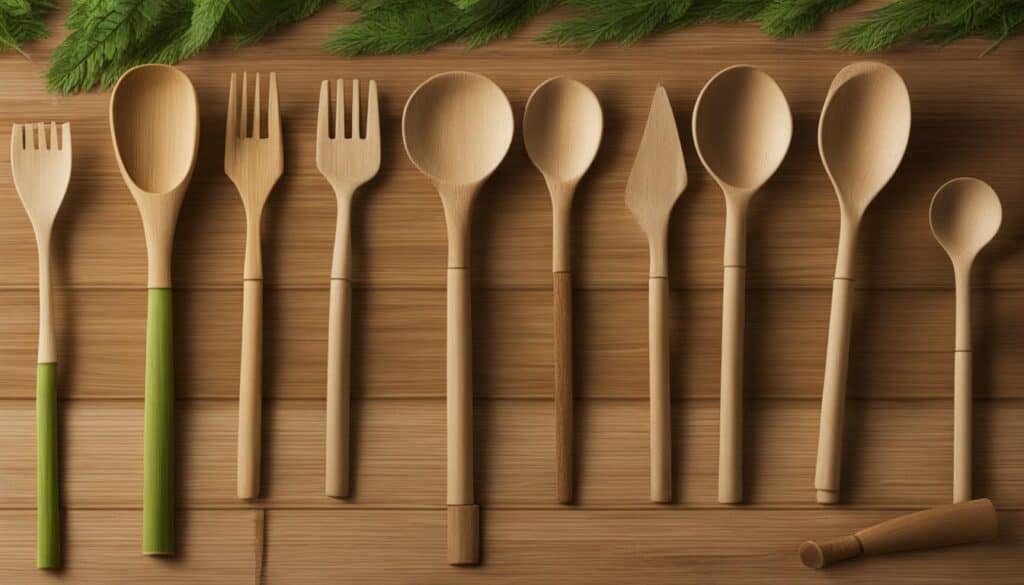
The Role of Renewable Resources in Cutlery Production
Renewable resources, revered for their minimal environmental impact, have taken the center stage in the fight against plastic. These materials, harvested from nature, have the power to renew themselves over time, hence perpetuating a cycle of sustainability and eco-consciousness. Bamboo leads as one of these flagship materials, hailed for its rapid growth rate and harvest sustainability.
Comparing Bamboo, Cornstarch, and Plant-Based Plastics
| Material | Source | Compostability | Other Features |
|---|---|---|---|
| Bamboo | Bamboo Plant | Industrial and backyard composts | Durable, naturally pest resistant |
| Cornstarch (CPLA) | Non-GMO Corn | Commercial composting | Mimics traditional plastic, strong and heat-resistant |
| Plant-Based Plastics | Natural substances such as sugarcane, straw | Various compostability levels | Offers alternative choices, visually appealing |
Bamboo, known for its rapid growth and minimal needs for cultivation, creates durable and visually distinctive cutlery. These utensils naturally resist pests and can decompose in both industrial and backyard composts. Cornstarch-based utensils, also referred to as CPLA, mimic traditional plastic in appearance but are uniquely derived from non-GMO corn. Their strength and heat-resistance make them an effective alternative, although they require commercial composting to break down effectively.
Plant-based plastics harness the power of natural substances like sugarcane and straw, presenting additional alternatives, each boasting unique qualities. These materials not only redefine disposable cutlery’s eco-friendliness but also represent a broader commitment to renewable and sustainable practices within the industry.
Sustainable Standards: Certifications for Compostable Utensils
As consumers increasingly prioritize sustainability in their purchasing choices, credible certifications have become fundamental in affirming the ecological credentials of compostable utensils. Among them, BPI-certified compostable and CMA-certified labels signify that these products uphold the rigorous ASTM standards for compostability. Achieving these certifications mandates that the products undergo stringent third-party testing to validate their compostability within a given timeframe.
- The cutlery must decompose into healthy, non-toxic soil, endorsing their claims of recyclability.
- These items must meet specific composting conditions akin to either a commercial composting environment or a home composting format.
Purchasing utensils bearing the prestigious FDA-approved status empowers consumers with the confidence that their selected items are non-toxic and devoid of harmful substances like BPA and chlorine. By adhering to the stringent guidelines of such reputed certifications, manufacturers clarify the purchasing process for consumers seeking sustainable cutlery alternatives, while also driving their own responsibility and accountability towards environmental stewardship.
“These certifications not only demystify the purchasing process for those seeking green alternatives but also foster transparency and accountability from manufacturers, ensuring that the cutlery contributes positively to the environment and human health.”
Top-Rated Biodegradable Utensils for Parties
As an enthusiast of sustainable party solutions, I certainly can’t resist sharing about two remarkable offerings in the market. Leading the way in bringing guests a more eco-savvy dining experience are brands known for their finesse in creating biodegradable utensils. They’ve mastered the balance between durability and disposability, raising the bar on what party-goers can expect from compostable tableware. Allow me to introduce you to Ecovita and GreenWorks, both champions of party utensils that are as kind to the planet as they are to your purchasing conscience.
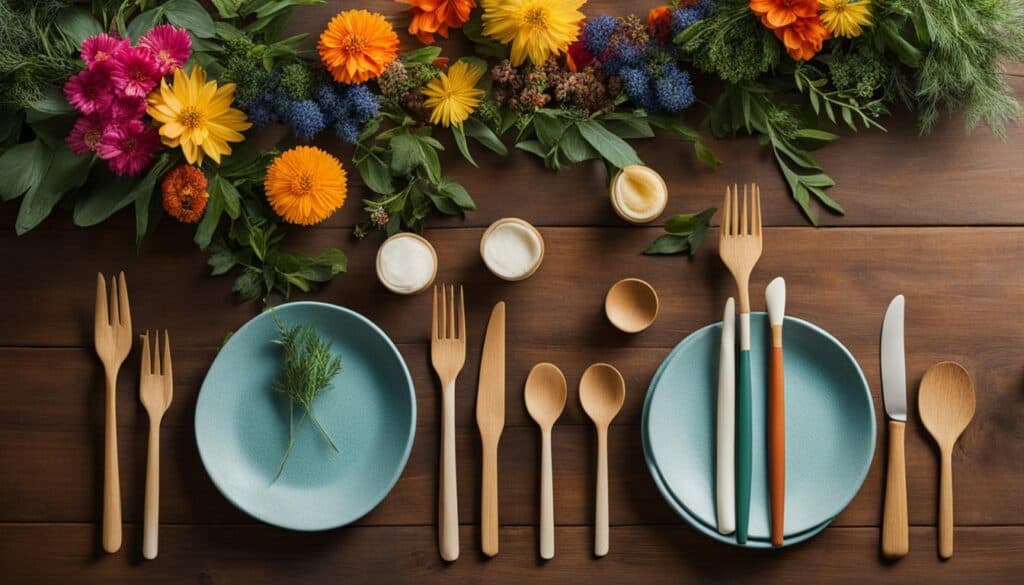
Ecovita’s 100% Compostable Tableware
Ecovita’s tableware embodies sustainability, without compromising on aesthetic appeal or functionality. Produced from Non-GMO corn, these plant-based utensils set high standards for eco-conscious gatherings. Their BPI-certified compostable credentials assure that you’re offering your guests non-toxic companions to their meals. The company’s dedication to environmentally friendly materials and processes ensures you can host your party with minimal environmental impact.
GreenWorks’ Sturdy Cornstarch Flatware
For those robust dinner fares that burglars tradition plastic cutlery, you’ll find an ally in GreenWorks’ sturdy cornstarch flatware. Increasingly popular with party hosts, these utensils bear testimony to quality married with sustainability. Fabricated to meet FDA standards, these utensils offer a balance of sophistication, sturdiness, and eco-responsibility. It doesn’t take much to see that sustainable party planning can indeed offer an unmatched experience, aligning excellence in performance with a lowered environmental impact.
With brands like Ecovita and GreenWorks offering such promising products, the journey towards a more sustainable party seems not just probable, but enticingly pleasant. Whether you’re planning a casual backyard barbecue or an upscale dinner, equipping your event with these top-rated biodegradable utensils will be a step towards a greener and more sustainable celebration.
Eco-Friendly Features to Consider When Choosing Cutlery
When it comes to selecting sustainable utensils for your event, there are several elements worth considering. Both functional and aesthetic characteristics matter. It’s essential to find a balance, ensuring that the cutlery you choose not only enhances your celebration but also aligns with your eco-friendly prerogatives.
Heat Resistance and Durability of Sustainable Utensils
A robust collection of cutlery should be able to endure a wide range of temperatures. Heat resistance is crucial for ensuring a seamless dining experience, especially when serving warm dishes. But just as much as they need to handle heat, biodegradable utensils must also be durable. Sustainable alternatives must meet, if not exceed, the strength of their traditional plastic counterparts. After all, no one wants their knife to break mid-meal or their spoon to melt into their hot soup.
Aesthetic Appeal and Practicality for Event Planning
Aside from functionality, the look and feel of your cutlery play an influential role. The visual appeal of biodegradable cutlery can significantly elevate your event’s décor. For instance, the earthy elegance of polished bamboo or the sleek aesthetic of matte-finish cornstarch can provide a touch of sophistication that distinguishes your party.
But it’s not just about looks. Equally important is the practicality of cutlery. From handling and storage to responsible disposal, practical considerations can largely impact the planning and execution of your event. The option to compost your utensils after use, for example, not only makes for easy cleanup but also aligns with your sustainability objectives.
To summarize, when opting for eco-friendly cutlery, it is essential to consider key features like heat resistance, durability, aesthetic appeal, and practicality. Informed choices lead to successful event planning that reflects your ecological ethos, contributing positively towards a sustainable future.
| Features | Description | Importance |
|---|---|---|
| Heat Resistance | Ability to withstand high temperatures without deforming | Guarantees a satisfactory dining experience with warm dishes |
| Durability | The strength of the utensils, particularly in comparison to standard plastic cutlery | Ensures the utensils can handle the strain of use without breaking or cracking |
| Aesthetic Appeal | Aesthetic quality of the cutlery (e.g. polished bamboo, matte-finish cornstarch, etc.) | Contributes to the overall décor and theme of the event |
| Practicality | Ease of use, storage, and disposal of the cutlery responsibly | eases event planning and execution, allowing for efficient clean-up and alignment with sustainability objectives |
Top Picks for Compostable Cutlery: Reviews and Recommendations
As we delve into the world of compostable cutlery, it’s essential to highlight the top picks in the market. Basing our selection on expert reviews, customer feedback, and environmental impact, we’ve compiled a list of commendable brands that prioritize sustainability without compromising quality and convenience.
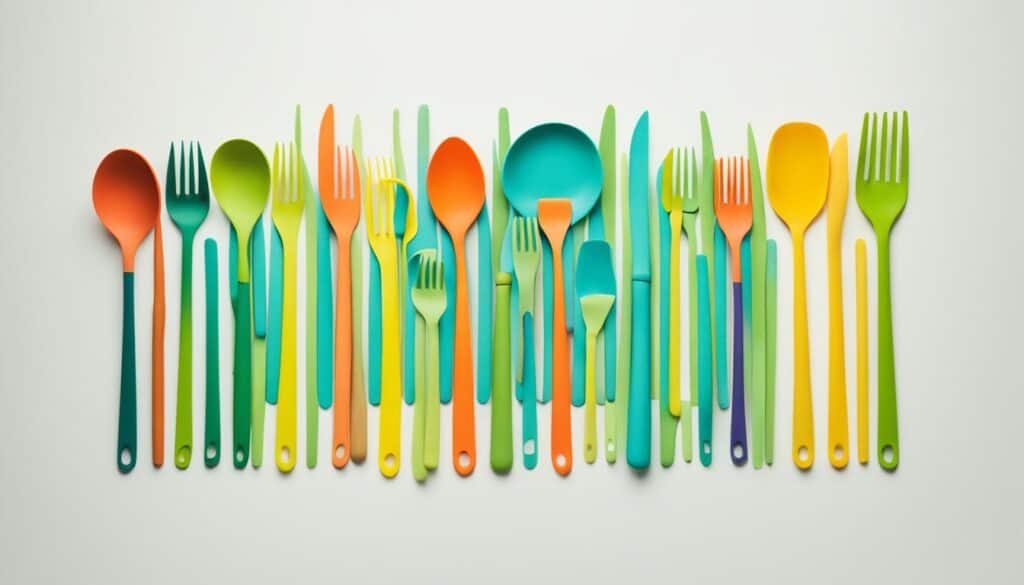
Whether you’re serving appetizers, main courses, or desserts, having a versatile eco cutlery combo set enhances the party experience. From compostable knives and forks to spoons, these sets provide a full suite of utensils designed for single-use, easing cleanup while promoting environmental conservation.
“After trying out different brands, I found that compostable wooden cutlery stands out. Their durability is impressive considering they’re designed for a single use. Interestingly, they also bring a rustic charm to my table settings.”
I can echo these sentiments based on my personal experience and observations from a wide range of online reviews. Each item of the cutlery set has its unique strengths – the compostable knives offer an excellent cutting edge, the forks prongs are sturdy for piercing food, and the spoons are deep enough for soup servings. The tactile feel enhances the dining experience, while the confidence of knowing they’re compostable makes the party more enjoyable.
| Compostable Cutlery Type | Strengths |
|---|---|
| Compostable Knives | Robust cutting edge, suitable for a variety of foods. |
| Compostable Forks | Sturdy prongs, suitable for salads and main courses. |
| Compostable Spoons | Deep scoop, suitable for soups and desserts. |
| Compostable Wooden Cutlery | Durability, rustic charm, and compostability. |
Remember, compostable cutlery isn’t just about making a greener choice; it’s about sharing that choice with your guests and inspiring them to do the same. As more of us embrace these sustainable choices, we contribute to a broader cultural shift towards respecting and nurturing our environment.
From Waste Reduction to Style: The Advantages of Switching to Biodegradable Cutlery
The contemporary shift towards sustaining our Earth brings with it an array of lifestyle changes, from energy-saving routines to eco-friendly product choices. Among these alterations, the choice of cutlery in our everyday living often goes unnoticed; however, this seemingly minor aspect can immensely contribute to waste reduction and style enhancement if strategically approached. In this regard, it’s crucial to consider the absolute merits of switching to biodegradable cutlery.
Health Benefits of Non-Toxic Cutlery Choices
Forgoing the traditional plastic cutlery for its biodegradable counterparts offers immediate health benefits by assuring a dining experience free from harmful chemicals like BPA and chlorine. These non-toxic cutlery choices are not only safer for consumers but also a healthier option for our environment, significantly reducing the expanding footprint of disposable plastics. On the other hand, utilizing eco-friendly cutlery exudes a reflection of conscious living and mindful consumption, creating a positive influence within both the immediate and broader communities.
Contributing to a Circular Economy with Eco-Friendly Cutlery
Notably, embracing biodegradable products allows party planners and general consumers to actively partake in the burgeoning circular economy. In this system, materials are destined to return to the loop in a closed, regenerative cycle, reducing the need for virgin resource extraction.
The selection of biodegradable cutlery signifies a conscious transition towards a sustainable lifestyle, which resonates with a growing demographic of environmentally-minded individuals. Moreover, it underlines the fact that ecological responsibility seamlessly combines with our need for style and class. The elegance of a bamboo fork or the charisma of a cornstarch spoon inevitably elevates the aesthetic appeal of any gathering, contributing to a tasteful and Earth-friendly ambience.
Conclusion on Top-rated Biodegradable Utensils for Parties
Our exploration of top-rated biodegradable utensils for parties has been enlightening. We have confirmed that sustainable party planning is more than a passing trend; it is an expression of environmental responsibility for eco-conscious consumers. From bamboo forks to cornstarch spoons, the numerous compostable cutlery choices available serve as tools of empowerment for hosts looking to celebrate special occasions without forsaking their ecological values. By selecting these alternatives, we send a bold message about our commitment to preserving the planet for future generations.
As we forge ahead, it is heartening to witness the growing popularity of these sustainable alternatives. The widespread acceptance of such products is a testament to our collective desire for a greener future. A future where every decision we make, even something as simple as choosing the cutlery for our events, reflects our keen consideration of its ecological impact.
All said, our journey towards sustainable living is, and will be, a constant work in progress with ample room for innovation and improvement. Yet, it is reassuring to know that with each biodegradable utensil we pick, we’re helping to reduce the pressure on our landfills. Every effort counts, and together, we can contribute to a global movement towards a more sustainable and considerate way of living. Indeed, there is no better time than now to embrace the wave of environmental responsibility that promises a brighter, healthier, and greener future.
FAQ on Disposable Utensils
Q: What are the top eco-friendly alternatives to plastic cutlery for parties?
A: The top eco-friendly alternatives to typical disposable plastic utensils include disposable wooden cutlery, disposable bamboo cutlery, and compostable cutlery made from plant-based materials. These types of cutlery are not only fully biodegradable and compostable but they are also durable, stylish, and perfect for any party setting.
Q: Are there disposable wooden utensils suitable for parties?
A: Yes. Disposable wooden utensils, including forks, spoons, and knives are not just suitable for parties, but also classier compared to traditional plastic utensils. Disposable wooden cutlery sets often include all these necessary cutlery which are eco-friendly, sturdy, and have a unique, aesthetic appeal.
Q: Why should I consider using a cutlery set made from bamboo for my next party?
A: Bamboo cutlery sets are an excellent alternative to plastic or disposable utensils because they are sustainable, eco-friendly, and biodegradable. Additionally, they offer a more elegant and earthy look compared to conventional plastic utensils, which can enhance the overall aesthetic of your party.
Q: Can I find a disposable eco-friendly cutlery combo set for my party?
A: Absolutely. Many reputable cutlery brands offer eco-friendly disposable cutlery combo sets made from compostable and biodegradable materials like wood and bamboo. Such sets typically include knives, forks, and spoons, providing a complete solution for your party needs.
Q: How does using wooden utensils help in promoting sustainability?
A: Wooden utensils are a sustainable alternative to plastic because they are made from a renewable resource – wood. Additionally, they are biodegradable and compostable, meaning they break down over time without harming the environment. In contrast, single-use plastic cutlery can take centuries to break down and often contributes to pollution and waste.
Q: What makes disposable wooden forks an attractive option for parties?
A: Disposable wooden forks are sturdy and have a unique aesthetic appeal that can elevate the look and feel of any event. They are also an eco-friendly and sustainable alternative to typical plastic forks. Using such eco-friendly disposable utensils demonstrates a commitment to the environment and encourages others to do the same.
Q: Are sustainable cutlery options more expensive than standard plastic utensils?
A: While it’s often true that sustainable options can be slightly more expensive, the cost difference has been decreasing as demand increases and manufacturing becomes more efficient. Plus, the environmental benefits of choosing eco-friendly and compostable cutlery over single-use plastic cutlery certainly outweigh the minor difference in cost.
Q: Can compostable forks and spoons perform as well as traditional plastic utensils?
A: Yes. Compostable forks and spoons made from plant-based materials or wood are designed to be sturdy and durable. They can handle a variety of foods without breaking or bending, making them a reliable alternative to traditional plastic cutlery.
Q: What are the top-rated eco cutlery brands available in the market?
A: There are several top-rated brands in the market that offer eco-friendly disposable cutlery options. Some of them include GreenWorks, World Centric, Naturally Chic, and Bambu. They offer a variety of utensils including forks, spoons, and knives made from sustainable and compostable materials.
Q: How can I dispose of eco-friendly disposable utensils after my party?
A: Most eco-friendly disposable utensils can be thrown into your compost bin, as they’re made from compostable materials like wood or bamboo. Alternatively, they can be disposed of in the regular waste, where they will naturally decompose over time without leaving any toxic residues.

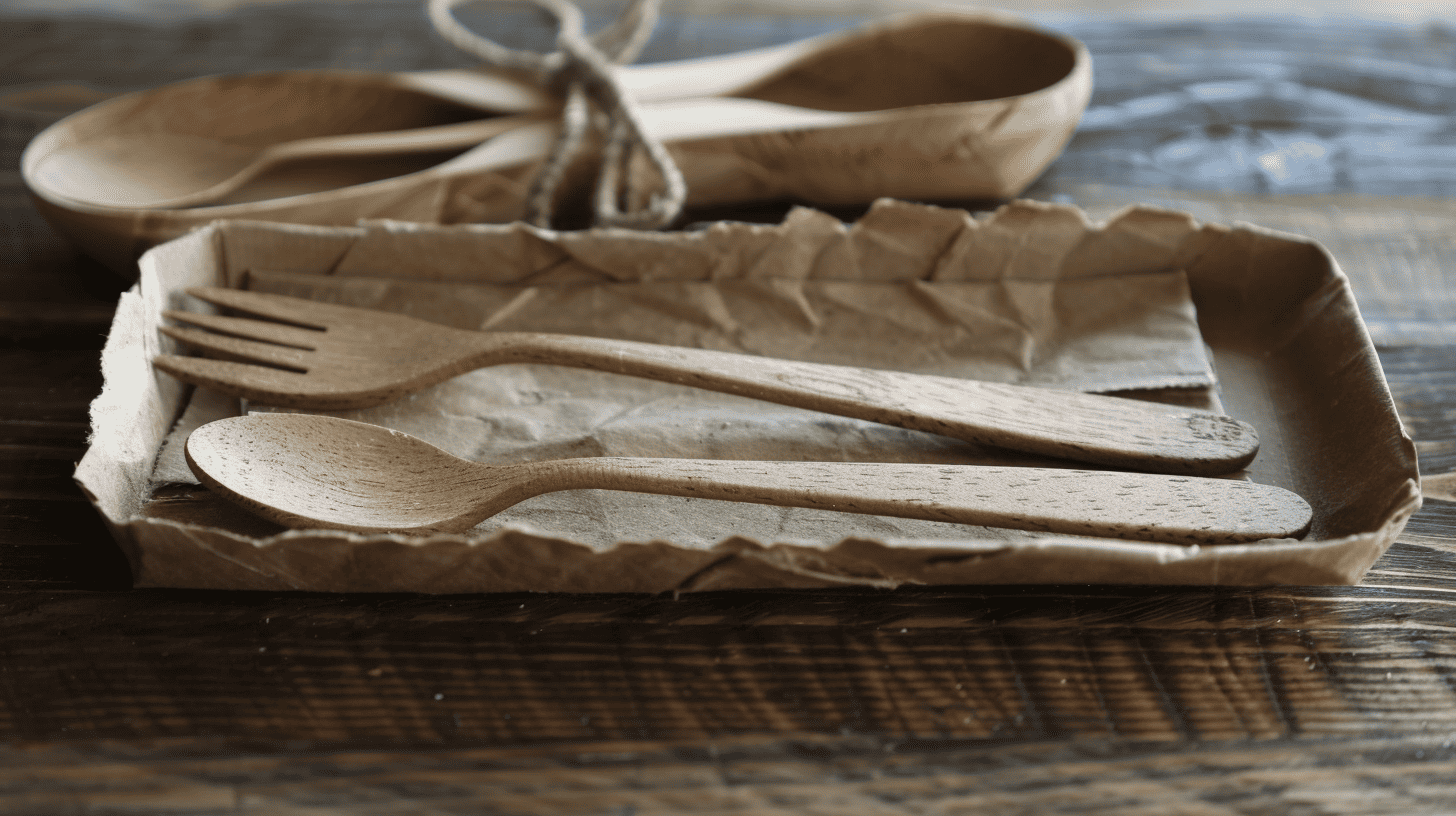


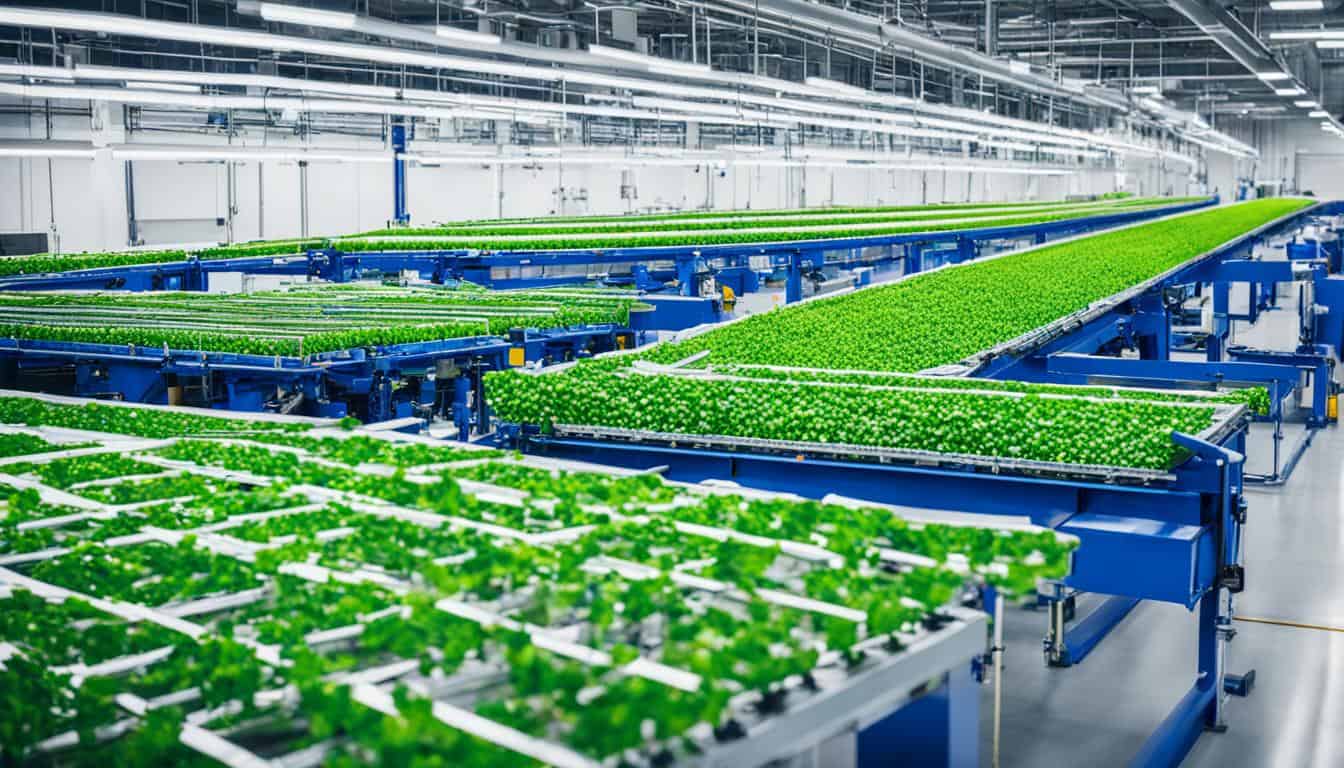
Leave a Reply